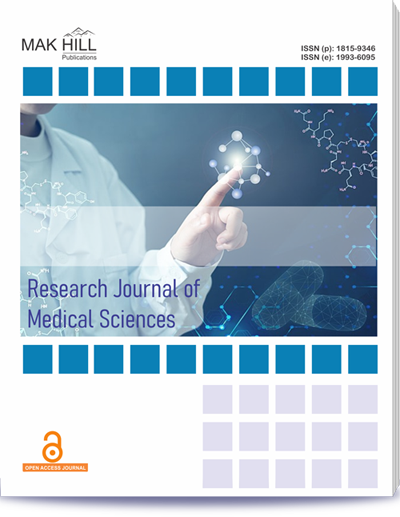
Research Journal of Medical Sciences
ISSN: Online 1993-6095ISSN: Print 1815-9346
Abstract
The aim of this study was to investigate the relationship between cardiovascular biomarker levels and the degree of alcohol intake in alcoholic subjects, considering the pro‐oxidant effects of alcohol as a significant mechanism contributing to increased cardiovascular risks. Emerging risk factors such as lipoproteins, high‐sensitivity C‐reactive protein (hs‐CRP), lipid profile and prothrombotic and pro‐inflammatory factors were also examined. One hundred twenty three alcoholic subjects aged 18‐60 years were randomly selected. Serum levels of hs‐CRP and Lp (a) were determined using turbidimetric immunoassay, while serum cholesterol was measured using CHOD‐POD and triglycerides using an enzymatic colorimetric method. LDL cholesterol was calculated using the Friedwald equation. There was no significant association observed between mean serum total cholesterol levels and different alcohol drinking groups. However, mean TG and LDL levels were significantly higher in occasional and heavy drinkers compared to low‐moderate and moderate drinkers. Among occasional drinkers, mean serum HDL cholesterol levels were significantly elevated compared to other groups. Our findings suggest that heavy drinking may lead to significant dyslipidemia and inflammatory changes, adversely affecting the cardiovascular system. However, occasional drinking demonstrated a beneficial effect on HDL levels, while moderate drinking showed favorable effects on hs‐CRP levels. Nonetheless, further large‐scale studies are warranted to confirm these potential benefits of occasional to moderate drinking on cardiovascular health.
How to cite this article:
Shashank Tyagi, Preeti Nigotia, Yashvardhan Raghuvanshi and Garima Pardhi. Impact of Alcohol Intake on Cardiovascular Biomarkers: A Prospective Analysis.
DOI: https://doi.org/10.36478/10.59218/makrjms.2024.3.201.204
URL: https://www.makhillpublications.co/view-article/1815-9346/10.59218/makrjms.2024.3.201.204